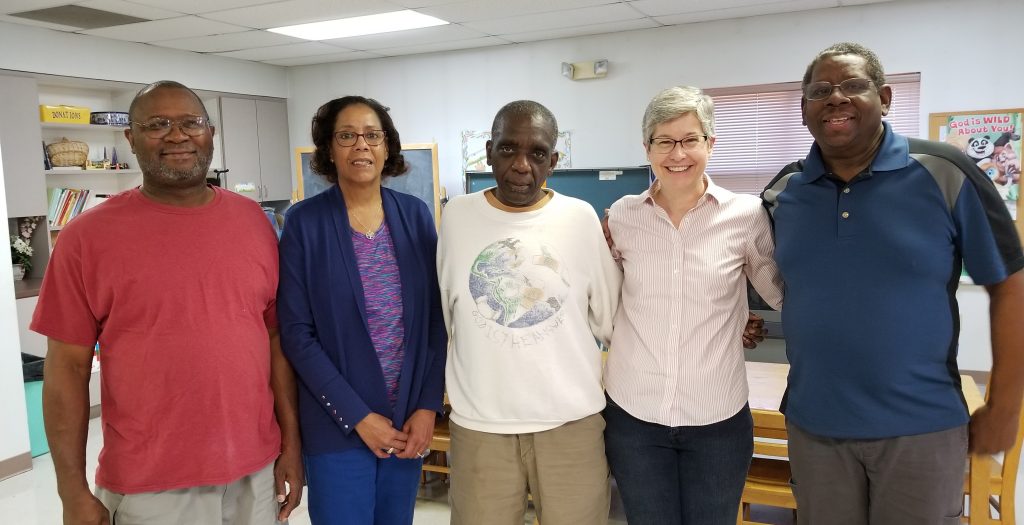“I want to read this book more than anything else in this world, but it is just so hard.”
“I think I’m going to quit my Sunday school class. I keep getting called on to read, and everybody can see I can’t do it.”
“I looked for Psalms in my Bible, but I couldn’t find it. Psalms begins with an ‘S,’ right?”
“I want to be a leader in my church, but I’ve got to be able to read this book.”
READ Center Students have held out their Bibles and said these or similar words over and over and over again. They are right—it is an incredibly difficult book to read. Yet it is dear to them, and they know it holds keys to abundant life.
It is dear to me, too, so in 2015 when Patrick Keyser, then an Episcopal Service Corps intern at my church and an adult literacy tutor himself, approached me with the idea to partner The READ Center with the Forum for Theological Exploration on a grant project, I was all for it.
Patrick’s idea was to offer a literacy class for people who specifically want to read the Bible. We approached Karen La Forge, who had just joined READ, and she said “yes” almost before we could get the words out. So that September we trained our first tutors, spread the word, and gathered five brave students.
Our classes are a joy. As all of us are people of faith, we begin with prayer. We use prayers from various traditions, distributing copies for each student and tutor so we can all read the prayer at the same time. The prayer becomes a warm-up exercise as we analyze the phonetic construction of words we don’t know, look up definitions for new vocabulary, and discuss images and allusions used in the prayers.
Although all our students want to read the Bible, each student has a specific goal in mind. One student longs to read aloud in worship services. Another wants to be competent in Sunday school classes. Another is responsible for leading her Sunday school class. One wants to read the prophets, another wants to read the parables.
We focus on student goals, but sometimes we don’t have enough tutors to meet each student’s needs. On those days we use a common reading and work as a group. At present we are marching through the Acts of the Apostles chapter by chapter. (By the way, the “t” in “apostles” is silent. Isn’t that annoying?)
We have grown to love and trust one another, which is almost a hazard. Our students often want to share interpretations of scripture. Because they have grown deep relationships with the tutors, they want to hear our opinions, too. But ours is a literacy class using the Bible—not a Bible study class. The tutors and I resist interpreting scripture. That’s a job for their pastoral leaders.
We do emphasize comprehension skills, however. We “get curious”—a catchphrase I hope sticks with students long after I am gone. We encourage students to ask lots of questions, looking for details, attending to the sequence of events, visualizing scenes, and using other comprehension tools. We go slowly, focusing on the passage in front of us and resisting the temptation to jump ahead too quickly. Reading scripture takes time and is worth savoring.
Our tutors have embraced this dance. They, too, love reading scripture and are passionate about empowering people to read it for themselves. They bring their skills and experience to the table to set alongside the skills and experience of the students, and the transformative experience of the class effects all of us.
Together we have made significant progress. Mr. C has read completely through the Gospel of John, universally acknowledged as the most difficult of the Gospels. Mr. H wanted to read in a worship service. He selected the Beatitudes, and we approached the Rev. Phoebe Roaf, Rector of St. Philip’s Episcopal Church which hosts our class, for permission for him to read on a Sunday morning. She graciously agreed. Mr. H practiced for several months. The great day came, and as Mr. H approached the lectern, all the tutors held hands and our breath. Of course, he read smoothly and perfectly, with confidence and expression. He was brilliant. After the service, many parishioners came forward to congratulate him.
Patrick is now at Yale Divinity School and on track for ordination. I am about to retire. Our class, however, is strong and dedicated to the work before them. The students will move forward side-by-side with their excellent tutors, reading the dearest book in their lives.
Note: The READ Center is not affiliated with any religion. We are a diverse organization and welcome all students who want to improve their literacy skills and all volunteers who want to help them. The READ Center serves adults. We support students’ literacy goals and respect their choices of the reading materials that motivate them and help them achieve their goals.


